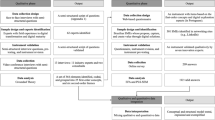Abstract
Meyer (2006) has offered an interesting array of initiatives that scholars in Asia can pursue in enhancing their contribution to the body of management knowledge. While the objective of his agenda seems timely and relevant, it raises some fundamental questions that encompass issues such as the scope of research questions that Asian researchers could pursue, the debate over rigor versus relevance, and the role of established top tier journals in furthering the Asian management research agenda. This paper discusses some of these issues in the spirit of fostering a continued dialog on the important questions that Meyer raises.
Similar content being viewed by others
Notes
Speech delivered to the British Association for the Advancement of Science. Cited in http://en.wikiquote.org/wiki/William_Thomson. Accessed on 23rd Feb., 2007.
My rudimentary analysis of the publication records of 253 faculty at the top three management institutions in India showed that they had published a paltry 17 articles over their careers thus far in the group of the top 25 journals as identified by Meyer (2006).
For example, even the business cases available in the public domain from Asian institutions are of uneven quality and do not compare well with similar outputs from U.S. or European schools. This would indicate the need for more methodical focus on qualitative writing.
References
Au, K. 2007. Self-confidence does not come isolated from the environment. Asia Pacific Management Journal, 24(this issue).
Chang, S. J., & Hong, J. 2002. How much does the business group matter in Korea? Strategic Management Journal, 23: 265–274.
Hofstede, G. 2007. Asian management in the 21st century. Asia Pacific Journal of Management, 24(this issue).
Khanna, T., & Palepu, K. 1997. Why focused strategies may be wrong for emerging markets. Harvard Business Review, 75: 41–51.
Kim, H., Hoskisson, R. E., Tihanyi, L., & Hong, J. 2004. The evolution and restructuring of diversified business groups in emerging markets: The lessons from chaebols in Korea. Asia Pacific Journal of Management, 21: 25–48.
Laudan, L. 1986. Science and values: The aims of science and their role in scientific debate. Berkeley and Los Angeles, CA: University of California Press.
Li, M., Ramaswamy, K., & Petitt, B. S. P. 2006. Business groups and market failures: A focus on vertical and horizontal strategies. Asia Pacific Management Journal, 23: 439–452.
Meyer, K. E. 2006. Asian management research needs more self–confidence. Asia Pacific Journal of Management, 23: 119–137.
Peng, M. W. 2004. Identifying the big question in international business research. Journal of International Business Studies, 35: 99–108.
Peng, M. W. 2007. Globalizing the Asia Pacific Journal of Management. Asia Pacific Journal of Management, 24: 1–8.
Peng, M. W., & Delios, A. 2006. What determines the scope of the firm over time and around the world? An Asia Pacific perspective. Asia Pacific Journal of Management, 23: 385–405.
Peng, M. W., Lee, S.-H., & Wang, D. Y. L. 2005. What determines the scope of the firm over time: A focus on institutional relatedness. Academy of Management Review, 30: 622–633.
Ramaswamy, K., Li, M., & Petitt, B. S. P. 2004. Who drives unrelated diversification? A study of Indian manufacturing firms. Asia Pacific Journal of Management, 21: 403–423.
Ramaswamy, K., Li, M., & Veliyath, R. 2002. Variations in ownership behavior and propensity to diversify: A study of the Indian corporate context. Strategic Management Journal, 23: 345–358.
Yang, X., & Terjesen, S. 2007. In search of confidence: Context, collaboration, and constraints. Asia Pacific Journal of Management, 24(this issue).
Author information
Authors and Affiliations
Corresponding author
Additional information
I would like to thank Prof. Mike Peng (Editor-in-Chief) for the opportunity, encouragement, and guidance to write this commentary and Prof. Mingfang Li for his helpful comments in shaping the manuscript. I am thankful to Jitendra Singh for his research assistance. Errors and omissions are my own however.
Rights and permissions
About this article
Cite this article
Ramaswamy, K. Asian management research needs broader initiatives and focused incentives. Asia Pacific J Manage 24, 519–525 (2007). https://doi.org/10.1007/s10490-007-9039-2
Published:
Issue Date:
DOI: https://doi.org/10.1007/s10490-007-9039-2




